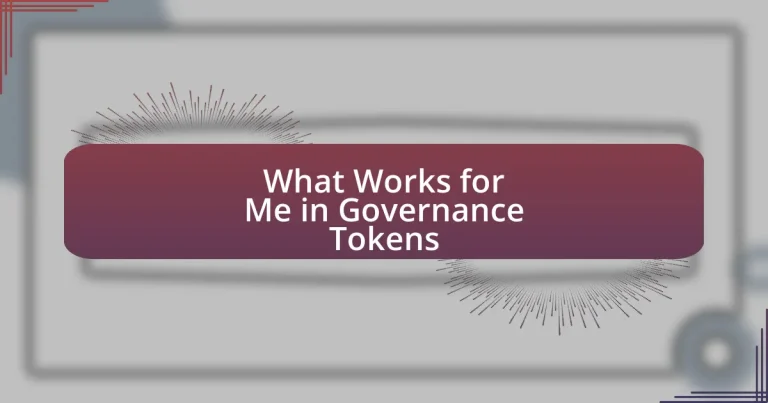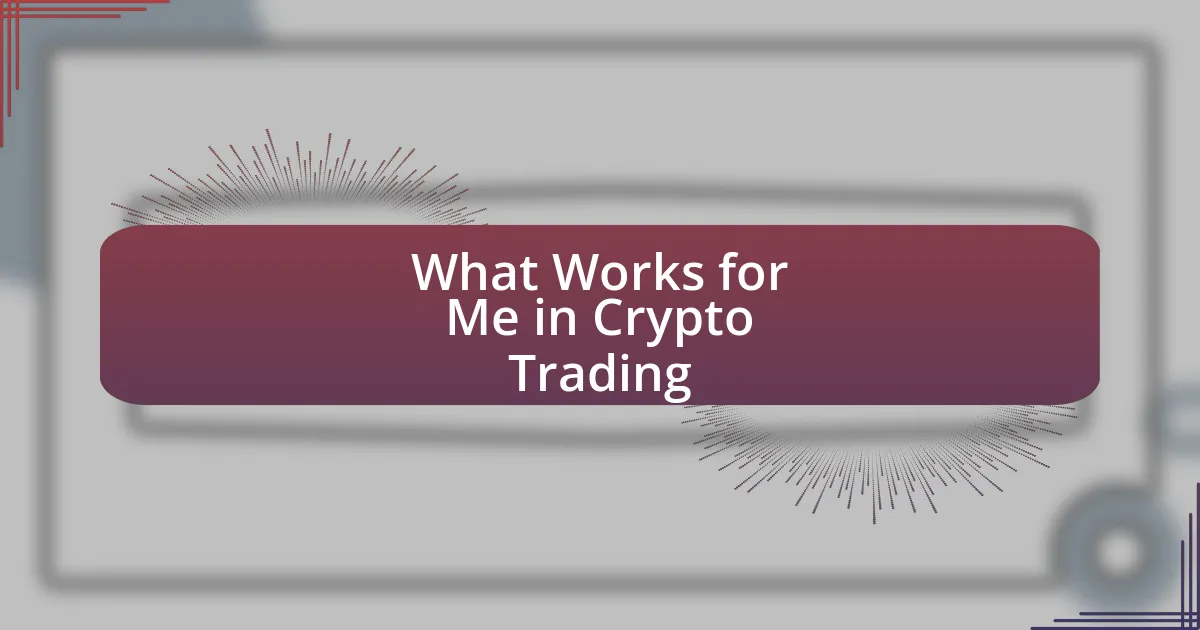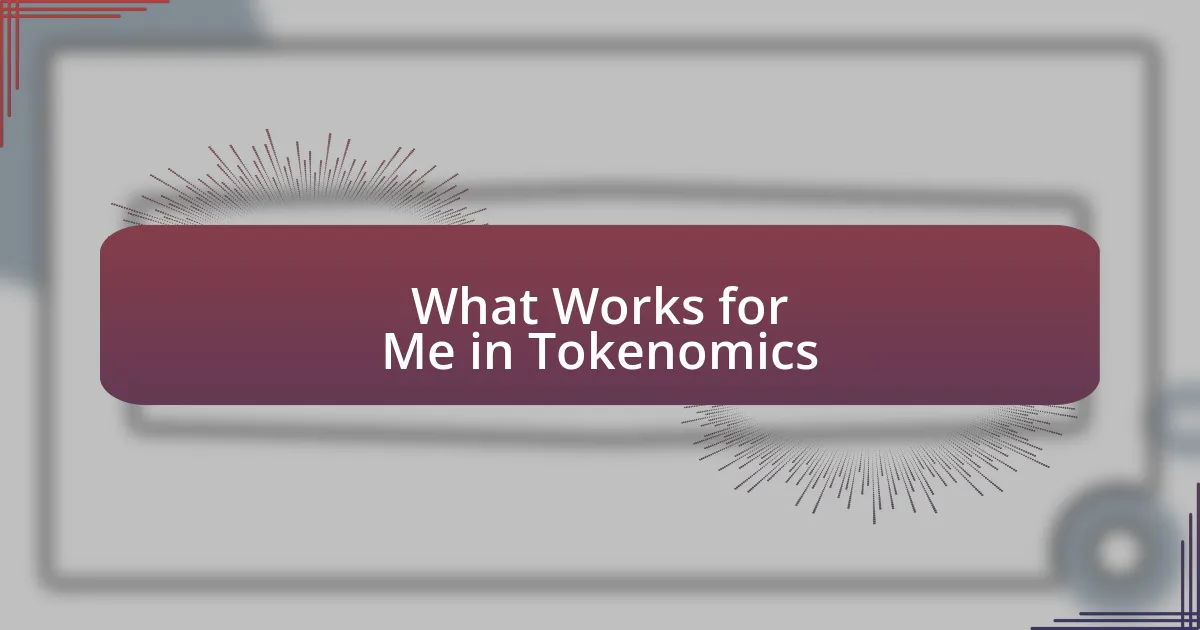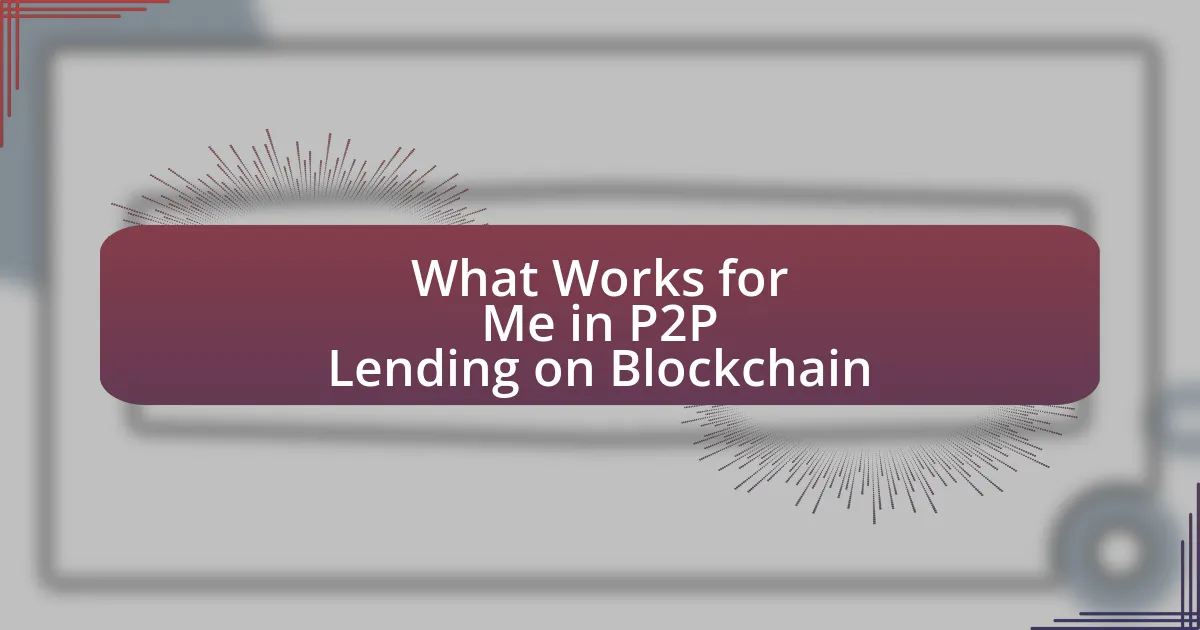Key takeaways:
- Governance tokens enable direct participation in decision-making for decentralized platforms, fostering a sense of ownership and community engagement.
- Successful governance tokens have features like strong community engagement, transparency, and adaptability, which enhance their effectiveness.
- Common challenges include voter apathy, difficulty in achieving consensus among diverse stakeholders, and technical barriers that limit participation.
- Future trends indicate a shift towards decentralized autonomous organizations (DAOs) and hybrid governance models to facilitate better participation and communication.
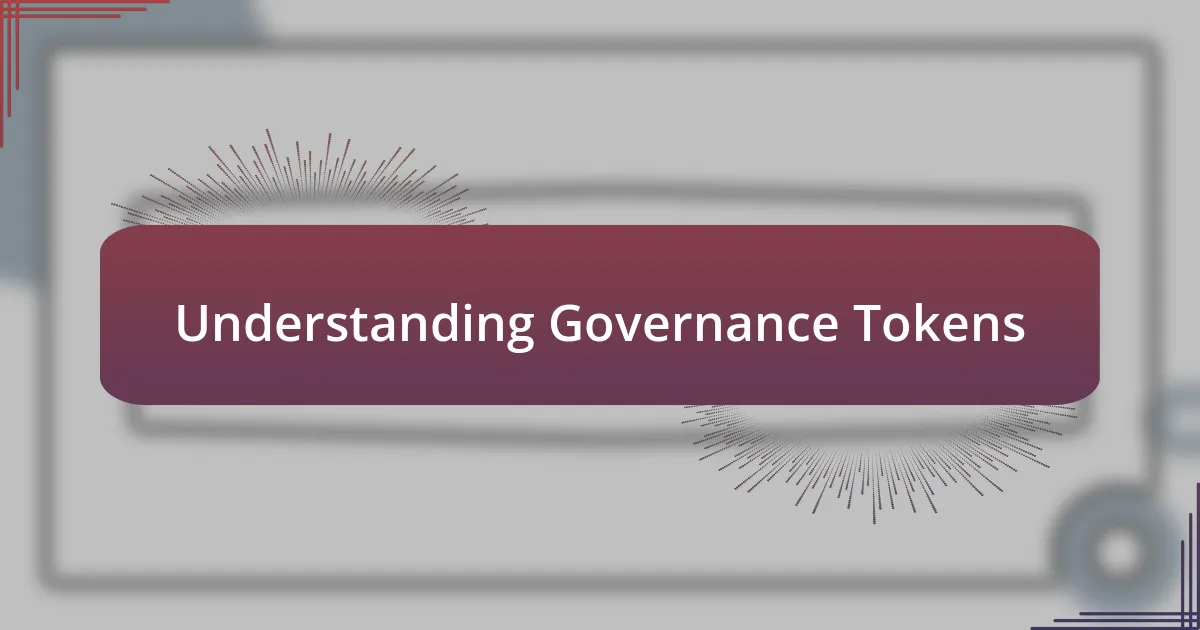
Understanding Governance Tokens
Governance tokens are unique digital assets that empower holders to participate in the decision-making processes of decentralized platforms. I remember the first time I held a governance token—I felt an intriguing mix of ownership and responsibility, as if I were part of something revolutionary. This ability to vote on protocol upgrades or funding proposals is not just a technical feature; it’s a chance to shape the future of the ecosystem in which I am invested.
What strikes me most is how governance tokens can transform the traditional hierarchy in organizations. Imagine being able to influence key decisions without being in a boardroom—it’s both thrilling and daunting. Have you ever thought about what it feels like to have a direct say in how a platform evolves? For me, it felt like stepping into a role where my voice truly mattered, something that’s often elusive in traditional corporate structures.
Additionally, the decentralized governance model fosters a sense of community and transparency. I’ve seen firsthand how projects with active governance participation tend to grow stronger and more resilient. When everyone has a stake and a say, isn’t it fascinating how collaboration can drive innovation? It’s a powerful reminder that each token represents not just a financial investment but a commitment to a collective vision.
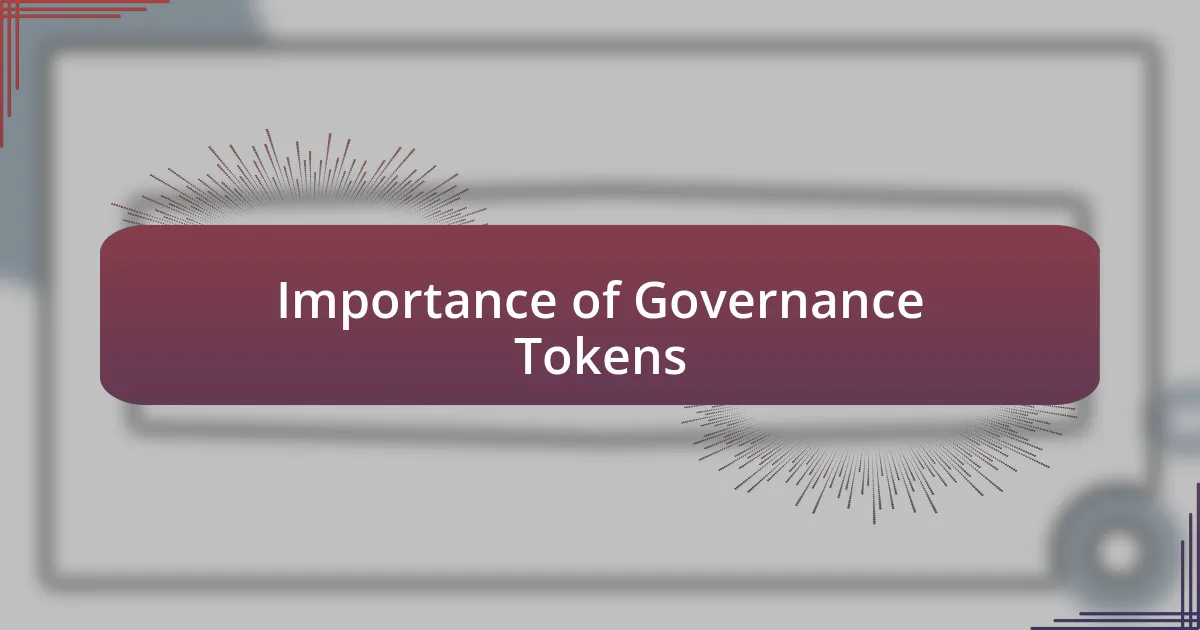
Importance of Governance Tokens
Governance tokens are crucial because they cultivate a democratic environment where every holder can contribute to significant decisions. I recall participating in a governance vote where the community debated a major protocol change. The knowledge that my vote could impact the outcome made the experience intensely personal. It was exhilarating to realize how tokens democratize influence, making decision-making a collective endeavor rather than a centralized one.
The impact of governance tokens resonates beyond just participation; they also secure a vested interest in the success of a project. I have often noticed that projects with active governance token holders exhibit greater accountability. This vested interest cultivates a sense of responsibility among members, leading to well-considered proposals and votes. Have you ever been part of a community where you genuinely felt your involvement mattered? For me, it adds another layer of engagement and investment in the ecosystem’s growth.
Moreover, governance tokens serve as a vehicle for innovation and change. From my perspective, the best ideas often emerge from diverse opinions, and with governance tokens, this diversity is encouraged. I’ve seen communities rally around proposals that initially seemed far-fetched but ultimately led to groundbreaking advancements. This illustrates how decentralized governance can push boundaries and inspire creative solutions that traditional models often stifle.
| Importance of Governance Tokens | Description |
|---|---|
| Empowerment | Allows holders to shape decisions directly, fostering a sense of ownership. |
| Accountability | Encourages responsible behavior among community members, enhancing project integrity. |
| Innovation | Facilitates diverse input, leading to creative solutions and advancements. |
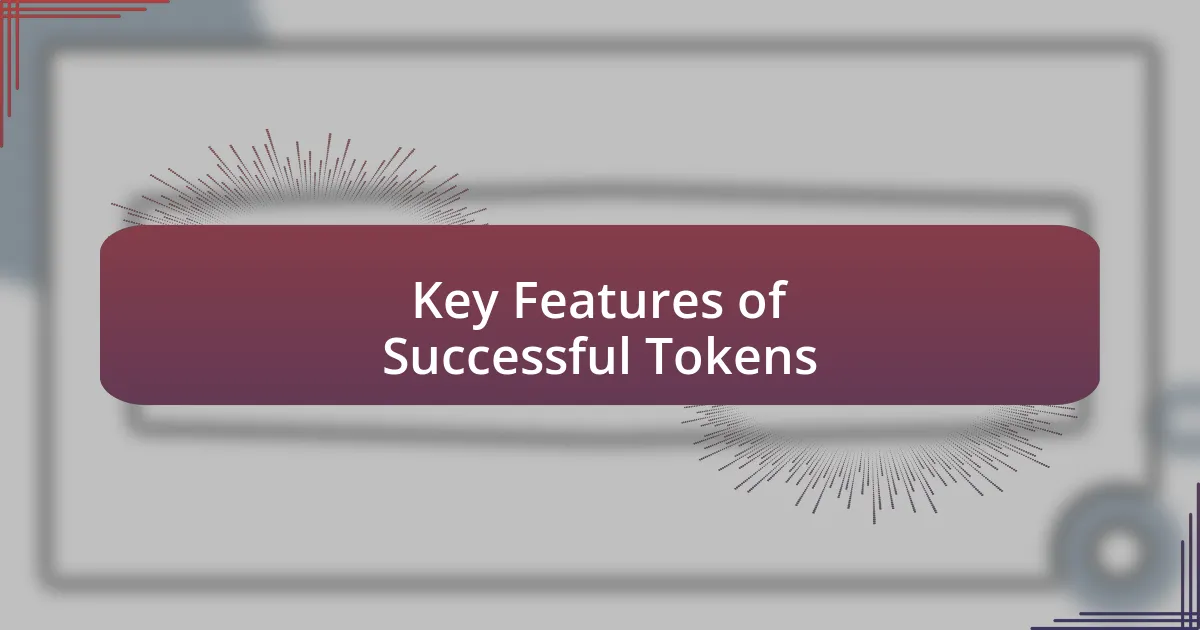
Key Features of Successful Tokens
Successful governance tokens possess distinct features that not only enhance their effectiveness but also foster a vibrant community. One aspect I’ve encountered is the importance of user engagement. When a governance token genuinely resonates with its holders, it transforms them from passive participants into enthusiastic advocates. I remember a time when I actively engaged in governance discussions, driven by the conviction that my input would truly shape outcomes. That connection added depth to my involvement and made each vote feel consequential.
Another key feature is transparency. I often feel more confident in participating when I understand the processes and rationale behind decision-making. Tokens that provide clear insights into their governance structures allow community members to feel informed and empowered. This transparency builds trust, which is fundamental for any successful governance model. Below are some essential features that successful tokens typically exhibit:
- Strong Community Engagement: Active participation fosters loyalty and dedication to shared goals.
- Clear Governance Structures: Defined rules and processes simplify decision-making and enhance understanding.
- Transparency in Communication: Open lines of communication help maintain trust and accountability within the community.
- Vested Interests: Aligning the token’s success with the stakeholders’ interests encourages responsible and constructive input.
- Adaptability: The ability to evolve and incorporate feedback reflects the community’s dynamic needs and preferences.
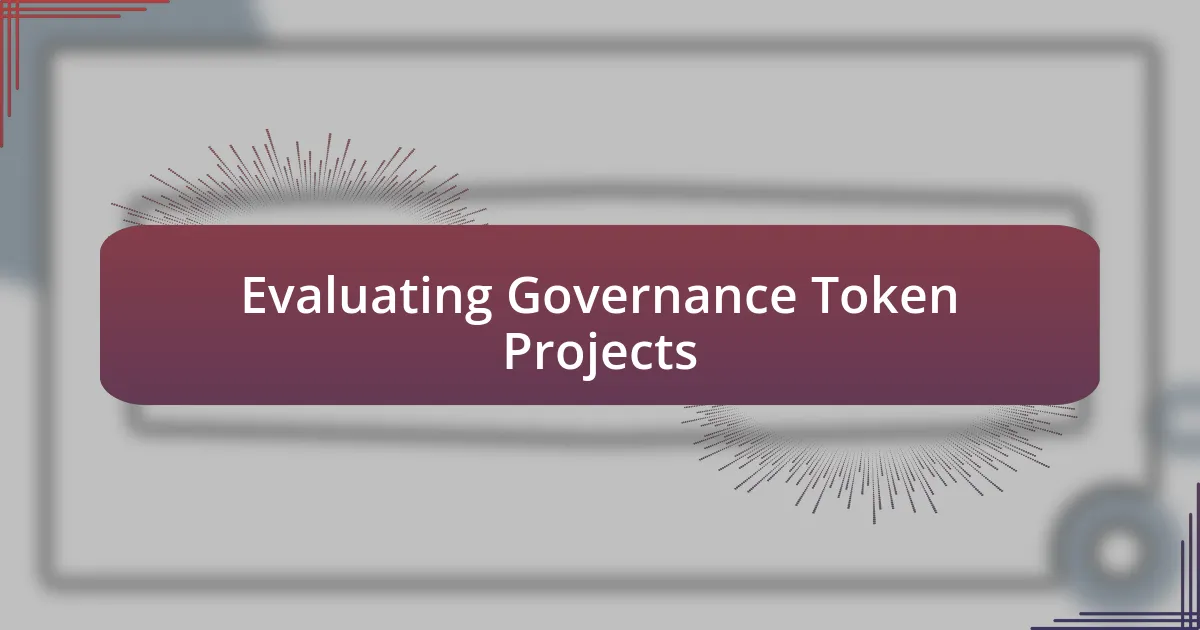
Evaluating Governance Token Projects
When I delve into evaluating governance token projects, one of the first aspects I look at is the project’s track record. Have there been significant improvements or changes made based on community feedback? I’ve seen some projects where the team genuinely listens, leading to tangible upgrades and renewed excitement among holders. That responsiveness not only showcases their commitment but also fosters a sense of ownership among participants.
Another element that stands out to me is the clarity of the governance model. Is it intuitive? The best projects I’ve engaged with offer straightforward outlines of how decisions are made and who gets to vote. When I encounter convoluted structures, I often feel a sense of frustration creeping in. It’s essential for me to have confidence that I can easily grasp the rules of engagement. After all, clarity empowers me and other token holders to make informed contributions to the community.
Finally, I can’t stress enough the importance of a strong and proactive community. I’ve found that vibrant communities often lead to innovative solutions and vigorous debates that enhance the governance process. Have you ever participated in a project where discussions sparked fresh ideas? Those interactions can enrich the experience immensely, making it feel like we are part of something larger. Evaluating governance tokens without considering community dynamics feels incomplete to me, as they ultimately drive the token’s success.
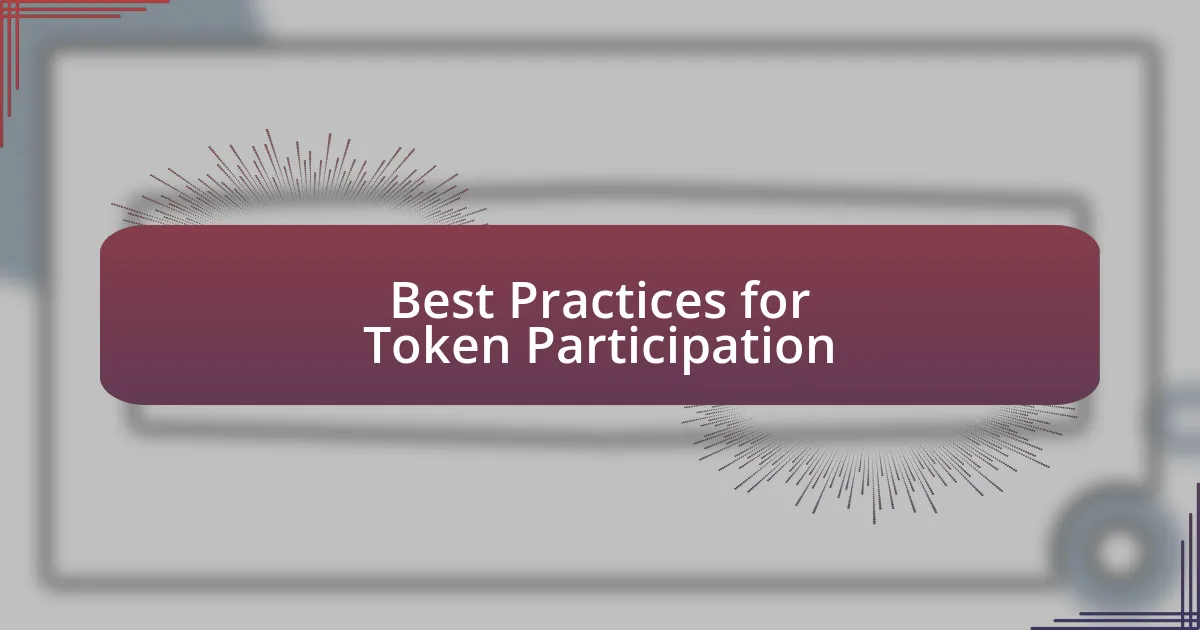
Best Practices for Token Participation
When participating in governance tokens, I’ve learned that engaging consistently with the community is essential. I remember a project where regular discussions not only kept me informed but also allowed me to voice my opinions. How often do we truly feel our perspectives matter? In that project, my participation validated my stake, strengthening my connection to the token and its direction.
Transparency in decision-making processes can’t be overstated. In one project I followed closely, the team shared detailed meeting notes and voting outcomes with the community. This openness created a sense of trust and accountability that made me eager to participate. When I see how decisions unfold, it prompts me to contribute more actively, as it feels like I’m part of a collaborative journey rather than a passive observer.
It’s also vital to stay informed about proposals and participate in voting regularly. I recall a time when I overlooked a significant vote because I didn’t track reminders. Missing out felt like a lost opportunity to shape the project’s future. What strategies do you use to make sure you don’t miss these critical moments? Finding a system that works for you can enhance your engagement and ultimately your influence within the governance structure.
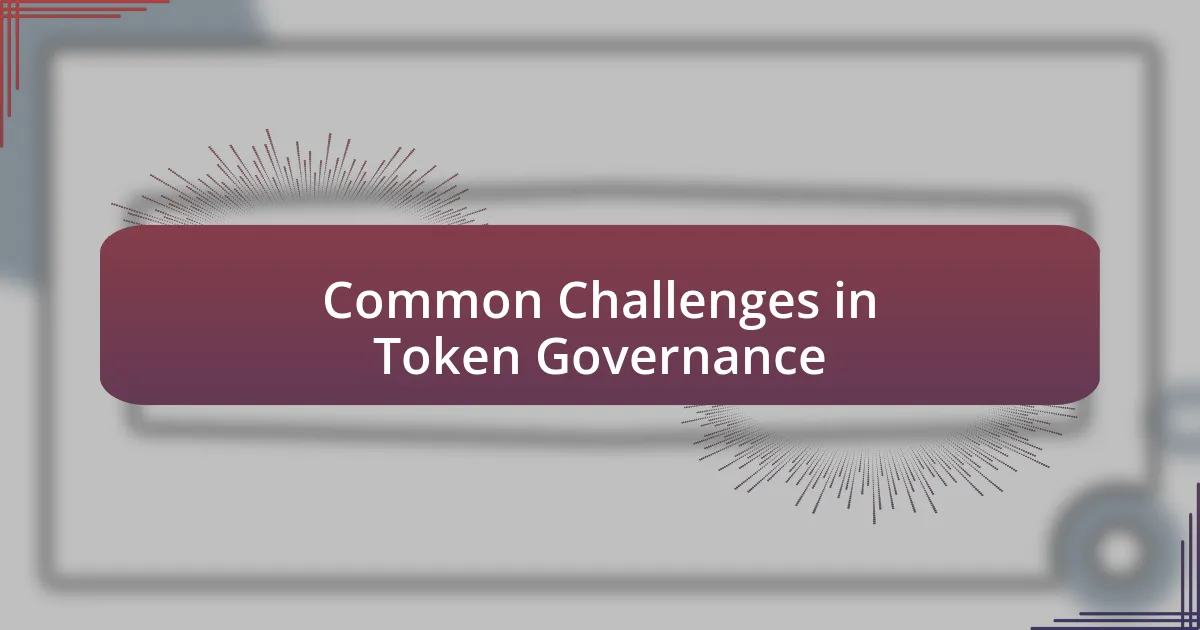
Common Challenges in Token Governance
One challenge I often encounter in token governance is the issue of voter apathy. I’ve noticed that even when a community has a clear incentive to participate, many holders simply don’t engage in voting. I sometimes wonder if it’s because they feel their individual votes don’t matter in the grand scheme. This reluctance can diminish the effectiveness of the governance model, leaving decisions in the hands of a small, active minority.
Another difficulty is achieving consensus among diverse stakeholders. Each token holder can have vastly different motivations and priorities. For instance, in a project I was part of, there was a stark divide between long-term investors and those looking for short-term gains. It was challenging to align everyone’s interests, leading to heated debates that often stalled progress. Have you ever been in a situation where your voice felt drowned out amidst conflicting opinions? It can be frustrating, yet this friction sometimes ignites more profound discussions that can lead to positive change.
Lastly, I find that technical barriers can hinder broader participation. Many governance models require a level of technical understanding that not all token holders possess. I recall a time when I struggled to navigate a complex voting platform that seemed more designed for developers than average users. How many other potential participants shy away due to similar hurdles? Simplifying these processes is crucial to fostering greater inclusivity and ensuring that all voices within the ecosystem are heard.
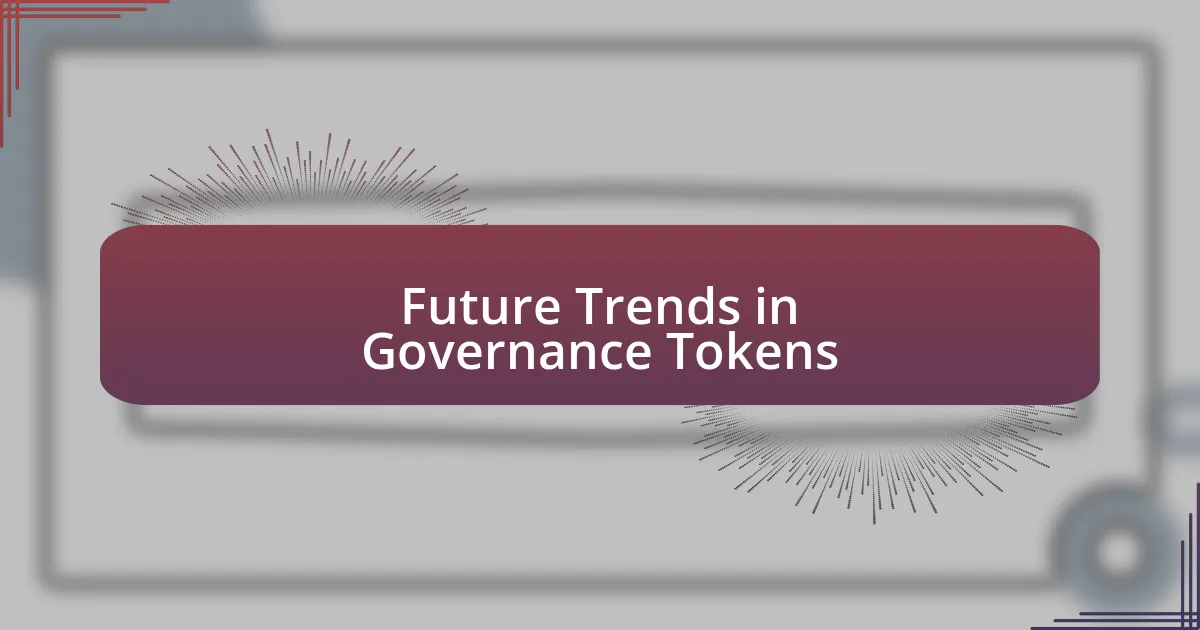
Future Trends in Governance Tokens
As I reflect on the future of governance tokens, I can’t help but notice a growing trend towards decentralized autonomous organizations (DAOs). In the projects I’ve engaged with, DAOs are becoming increasingly popular for their ability to streamline decision-making. It’s exciting to think about how these structures might empower even more voices in governance, but I wonder: will this truly lead to more equitable participation, or will it just create new forms of silos?
In my experience, the evolution of hybrid governance models is also a noticeable trend. These models combine on-chain and off-chain elements, which makes them more adaptable to varying situations. I remember a project where we used a hybrid approach, and it significantly eased communication between stakeholders. However, I can’t shake the feeling that finding the perfect balance in these models is tricky—how do we ensure that all community members feel valued in these dynamically shifting structures?
Moreover, I’ve been intrigued by the potential for innovative reward mechanisms to drive participation in governance tokens. For instance, I’ve seen projects experiment with offering tokens for active contributors, both in voting and discussions. This approach raises an intriguing question: could incentivizing participation actually lead to a more engaged community, or might it risk attracting “vote farmers” solely after rewards? It’s a delicate dance, but the outcome could dramatically shape the effectiveness of future governance systems.

